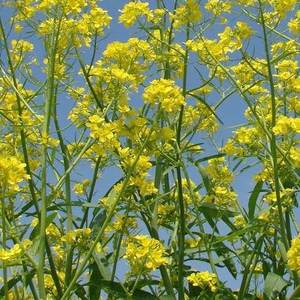Alabama governor awards Auburn University grant to study carinata

Photo: University of Florida Extension
April 15, 2019
BY The Alabama Department of Economic and Community Affairs
A $39,757 grant awarded by Alabama Gov. Kay Ivey will enable Auburn University to determine if an oilseed crop can be successfully grown and marketed in Alabama as a biofuel and become another cash crop for the state’s farmers.
Carinata, also known as Ethiopian mustard, is grown in Canada and the northern U.S. where it is converted into a biofuel for jet engines. A cool-season crop, carinata is being researched locally to determine if Alabama farmers could grow it in between other warm-season crops.
Advertisement
“Agriculture has and always will be a major part of Alabama’s economy,” Ivey said. “Much of that success can be attributed to research and innovation. Providing our Alabama farmers with an alternative winter crop will enhance our state’s agricultural economy.”
The study will determine not only if carinata can be successfully grown in the state, but if farmers are willing to grow it and if there is a suitable market for the product. Also to be considered is if there is available transportation and processing facilities.
The Alabama Department of Economic and Community Affairs is administering the program from funds made available to the state from U.S. DOE.
Advertisement
“The outcome of this study could lead to new innovations, cheaper energy and new jobs in Alabama,” ADECA Director Kenneth Boswell said. “ADECA is pleased to join with Gov. Ivey in this project.”
ADECA administers a wide range of programs that support law enforcement, victim programs, economic development, water resource management, energy conservation and recreation.
Related Stories
The USDA reduced its estimate for 2024-’25 soybean use in biofuel production in its latest WASDE report, released May 12. The agency expects soybean oil use in biofuel to increase during the 2025-’26 marketing year.
HutanBio's microalgal biofuel production shown to be net-negative in an independent life cycle assessment by EcoAct
HutanBio on May 8 announced that the production process for its proprietary HBx microalgal biofuel achieves net-negative carbon emissions, based on an independent cradle-to-gate life cycle assessment (LCA) conducted by EcoAct.
According to a new economic contribution study released by the Iowa Renewable Fuels Association on May 6, Iowa biofuels production has begun to reflect stagnant corn demand throughout the agriculture economy.
Repsol and Bunge on April 25 announced plans to incorporate the use of camelina and safflower feedstocks in the production of renewable fuels, including renewable diesel and sustainable aviation fuel (SAF).
U.S. operable biofuel capacity in February was unchanged from the previous month, according to data released by the U.S. EIA on April 30. Feedstock consumption for February was down when compared to both January 2025 and February 2024.
Upcoming Events










